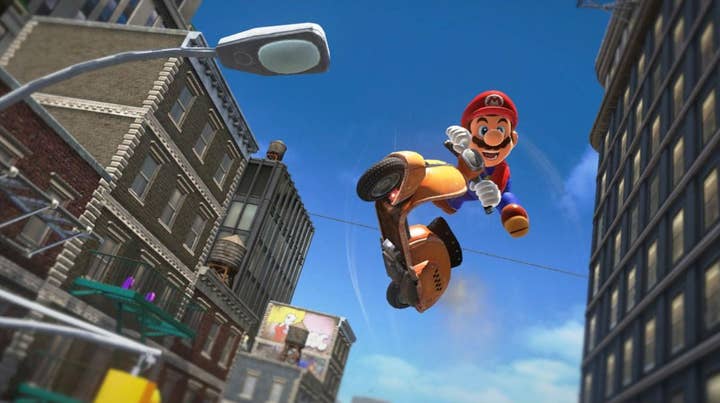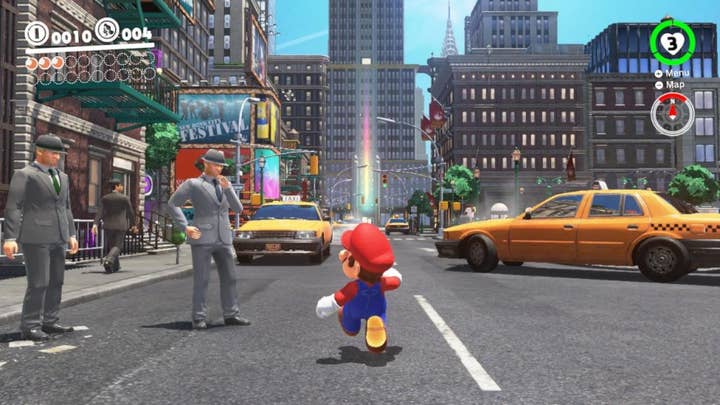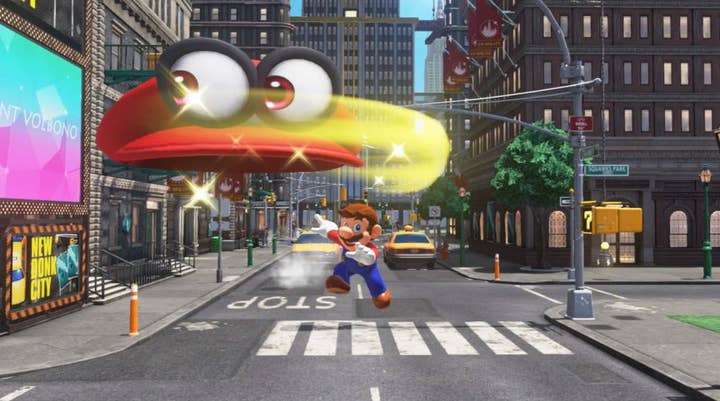Super Mario Odyssey: Critical Consensus
The critics heap adoration on Nintendo's big holiday release, another high-point in a year packed with them
Is there any IP, in any entertainment medium, as consistently and lavishly praised as Mario? In considering this question, only one other came to mind: Zelda, and the fact that both belong to Nintendo is no coincidence.
No coincidence because Nintendo has displayed both a remarkable degree of resilience to the games industry's many changes, and a remarkable ability to riff on its own ideas - some of which are now four decades old. But also no coincidence because the games press has a tendency to want to see the best in Nintendo's most famous franchises. Supposedly objective critiques often seem to start from the assumption that the game in question will be great, the text becoming an exercise in defining the nature and degree of its excellence.
Zelda: Breath of the Wild is a case in point; a tremendous game, rightly praised as a much-needed reinvention of the series by virtually every critic. However, look at the review scores awarded to the other Zelda titles released during Metacritic's lifetime and you'd be forgiven for thinking no reinvention was necessary.
"Zelda and Mario represent order and chaos, ego and id - and you can't reinvent something which is constantly reinventing itself"
Eurogamer
Twilight Princess has an average of 95, Skyward Sword an average of 93; both a hair's breadth from Breath of the Wild's score of 97, and yet neither is nearly as close to it in achievement or excellence. Indeed, the introductory paragraphs of a great many reviews of Breath of the Wild positioned these predecessors as disappointments, evidence of a long-running franchise spinning its wheels.
At the time of writing, Super Mario Odyssey has the same Metacritic score as Breath of the Wild, and it is being roundly hailed as a marked improvement on the Mario games of recent years - almost all of which have Metacritic scores of 90 or above, naturally. What it is not, though, is a stark reinvention in the vein of this year's Zelda. Indeed, according to Eurogamer, Odyssey is something of a throwback, albeit a throwback to one of the most influential games ever made.
"It is a time of rebirth at Nintendo, when conventions are swept aside and we can experience the magic as if for the first time," Eurogamer says, in a rare "Essential" review. "This is not a hope that Super Mario Odyssey can fulfil.
"That's not because it isn't a wonderful, continually surprising, never-not-novel game - it very much is. It's because the comparison relies on a false equivalence between the two series. Zelda is about tradition, about patterns, about repetition, and its appeal is bound up in the graceful, orderly symmetry of its design. To rip that up and start again was daring indeed. Mario, on the other hand, is a series of relentless forward momentum and anarchic non-sequitur, where traditions only exist to be subverted. Zelda and Mario represent order and chaos, ego and id - and you can't reinvent something which is constantly reinventing itself.

"So there's both freshness and nostalgia to be found in Odyssey, which resurfaces a dormant mutation of Mario, only previously seen in full effect in 2002's Super Mario Sunshine and 1996's epochal Super Mario 64. This Mario is defined by open, 'sandbox' levels stuffed with secrets and multiple goals that do not necessarily need to be attempted in order, but that sometimes change the context of the level when you complete them... If anything, Odyssey serves to underline just how radical a design Super Mario 64 was - and still is."
Waypoint draws the same line between Odyssey and Mario 64, going so far as to proclaim it "the direct sequel to Mario 64 many have been asking for since 1996." However, where Eurogamer describes the open-world structure as feeling "startlingly modern", Waypoint's initial impression was that Odyssey's game worlds felt "surprisingly small" in an era defined by virtual expanses that "can often be measured in miles."
"What's deceptive about Odyssey is how much is trapped beneath the surface. Playing Odyssey is akin to peeling an onion"
Waypoint
"At first, this proved worrying; I was speeding through worlds at a pace that suggested a short, if undeniably enjoyable, game. You quickly learn to stop and look around. It's at that moment that you become completely overwhelmed by possibility. What's deceptive about Odyssey is how much is trapped beneath the surface. Playing Odyssey is akin to peeling an onion. Your first pass through a world means very little; it's about getting a lay of the land, racking up checkpoints (which act as fast travel markers), and formulating ideas on what the game isn't explicitly telling you.
"You're a detective on the hunt for clues, and once you've gathered enough data, it's time to see where those leads take you. More often than not, it's something cool and interesting... I started taking notes on my phone, worried I'd forget about some tiny detail, inevitably distracted by another one. It's a game of tiny details endlessly stacked on each other, and after you've spent a few hours in a single world, convinced you've exhausted everything it has to hide, a character will suddenly reveal there are a dozen other moons to be found."
Power Moons are scattered across every world, and there's no shortage of them to be found. Waypoint reached the end of Odyssey with 272 moons collected, but there are incentives attached to collecting 500. "Beyond that," it says, "who knows?"
Of course, the amount of exploration required to collect so many moons demands spaces that reward an inquisitive nature, and on that count Nintendo has excelled. The Verge commends the range in Odyssey's environmental design, and an apparent willingness to go beyond the themes and ideas that have defined previous visits to the Mushroom Kingdom. At its most extreme, in fact, Super Mario Odyssey can be gratifyingly "weird."

"Most are the kinds of places you wouldn't necessarily expect Mario to be, from the New York-like cityscape of New Donk City, to a dark, crumbling castle that looks ripped right out of the gothic fantasy series Dark Souls.
"Each of these areas feels dramatically different from the last... It's downright bizarre to see Mario alongside regular humans in New Donk City, while other worlds have art styles that feel ripped from different games and genres. The lunch-themed world, for instance, feels like an arty indie game, with low-poly visuals and eye-poppingly bright colors... Even the music can be jarringly different: one minute you're listening to 8-bit-style chiptunes, the next there's a blues guitar blaring in the background."
"Cappy is Mario's only power-up throughout Odyssey, but his ability opens up a bewildering amount of options"
The Telegraph
All of which is burying the lead to a certain extent, because Odyssey's standout element isn't in the detail of its worlds; it's the hat on Mario's head, Cappy, a bizarre but brilliant concept that ties the whole design together. As The Telegraph points out in yet another five-star review, Cappy can be thrown as an attack, or to collect coins, or to interact with the environment, or - "Odyssey's big idea" - to possess the game's various inhabitants.
"Within minutes of meeting, Cappy is launched onto a frog and Mario is sent hurtling into the amphibian's body. His presence noted, of course, by that red hat and perfectly trimmed moustache. Now you can scuttle across water and propel yourself several stories into the air... In one sense, Cappy is Mario's only power-up throughout Odyssey, but his ability opens up a bewildering amount of options that our hero could only dream of. And each is perfectly judged and precisely designed.
"Odyssey pulls that fabulous Super Mario trick of a constant turnover of ideas, some used just once with a flourish to never be seen again, but none are throwaway. Each transformation is treated with the utmost care and craft, with physics and function given particular attention. Jump into a Bullet Bill and the weight of its flight feels right in the hands, Cheep-Cheeps swish their way underwater, while the caterpillar-esque Wigglers stretch, twist and retract with a delightful accordion's wheeze.
"This being a Mario game, the levels are built in such a way to make the best use of these new powers. Those Wigglers curl round obstacles with a delicious snap; you can inhabit a fireball and leap between lava, splattering hot puddles around to give you an extra outlet; Goombas can waddle on ice or be stacked up into a tower to reach higher places.
"Put simply, everything feels terrific."

Well, not everything - at least, not according to Glixel, which is notable for being one of the only reviews of Odyssey that recognises a handful of niggling problems. The design of its open-worlds features elements both "amusing" and "chore-like", Nintendo occasionally stumbling in its attempt to walk the line between abundance and busywork. A "puzzling" implementation of the Switch's motion controls also draws criticism, the player frequently prompted to use a feature that is "ostensibly" optional.
"Someday, leaning so heavily on doing what Mario has always done may not be enough"
Glixel
"These motion controls feels like a vestigial remainder from the last Mario games like this, the big, expansive 3D worlds found in Super Mario Galaxy, games that are now more than seven years old. And there are other underdeveloped things that tug at Odyssey, like a camera that both isn't very good and is a real pain to move around when you're in the heat of the moment... The environments here are so much more sophisticated, and it just doesn't feel like the camera has caught up.
"These issues stick out in part because of how good, how refined the rest of Super Mario Odyssey is."
And yet Glixel also found the experience overly familiar. This article opened with Eurogamer's assertion that Mario's very nature prohibits a total reinvention of the kind Breath of the Wild delivered for Zelda. But while Eurogamer and Glixel both agree that Odyssey is not pursuing the same goal, the latter is less convinced that such a thing is unnecessary or impossible.
"Super Mario Odyssey is more familiar a game than I expected. For whatever reason, I was expecting a more radical departure, something that felt less familiar less often.
"Of course, Zelda was in sore need of that reboot amid accusations that it was treading water. Mario hasn't needed that kind of reboot, and it's unlikely that Mario Odyssey will convince anyone Nintendo is anything but humming along, doing the things it's always done. But someday, leaning so heavily on doing what Mario has always done may not be enough - and there's just a bit of that kind of fatigue showing here.
"For now, as a Mario game that continues the Switch's moves to blur the line between the portable and the home-based console, Super Mario Odyssey is a beautiful, rewarding example of what Nintendo has in store for the system."
